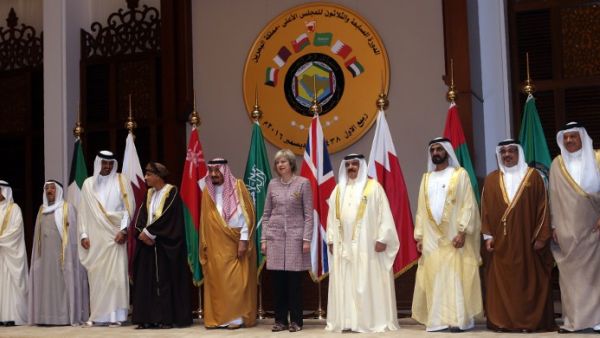Theresa May is introduced as 'Her Majesty, the Prime Minister of the United Kingdom' at Gulf summit in Bahrain. pic.twitter.com/X3t1Y3k71n
— Shaun Connolly (@shaunconnolly01) December 7, 2016
We might well be tickled by the slip-up, but there is something more sinister to the farcical set up of a western female leader speaking to a room of very powerful Arab men.
Theresa May addressing 6 Gulf leaders in Bahrain. In this vast room, there is just 1 other woman after the PM & her chief of staff pic.twitter.com/AUoZzjahVw
— Chris Ship (@chrisshipitv) December 7, 2016
The woman who recently became Britain’s Prime Minister - although no-one is quite sure how - has raised eyebrows by choosing the likes of the Saudi, Qatari and Bahraini leaders to hang out with on her first official visit.
Many pointed comments have been made in the press about the leader of a supposed liberal democracy visiting cozying up to states with such dubious human rights records.
May herself has said, regarding the trip, that “there are issues raised about human rights… we will rightly raise those." However, many suggest this will entail little more than “light finger-wagging”.
As May sits among her Arab peers, all of whom are male, we cannot help but wonder if she has given any thought to the position of her fellow women in the Gulf. Let’s break it down for her:
Clothing
Social conservatism is so rigid in the region that this week a Saudi woman was inundated with death threats for sharing a picture of herself out and about without the hijab to cover her hair or the black abaya to obscure her body.
"Kill her and throw her corpse to the dogs," was apparently the appropriate punishment for this outlandish behaviour.
Perhaps diplomacy has managed to restrain the Saudi king from speaking in such terms to May, who has outrageously displayed her hair in a bob, and dared to sport a trouser suit and and - shock horror! - a collar-bone-revealing top on the trip. We can only wonder what the penalty would be for such indecency if she was an ordinary woman in Saudi Arabia.
The right to hold political office
While Britain had its first female member of parliament almost a hundred years ago, and a female Prime Minister in 1979, women in Saudi Arabia only gained the right to run for office last year. Yes, you read that right.
Meanwhile, Qatar were practically trailblazers in allowing women the vote in 1999, with Bahrain following in 2002 and Kuwait in 2005.
Although, of course, the significance of being able to vote when you do not live in a transparent democracy is a moot point.
The right to her body
In these, as in many Muslim countries, rapists are granted leniency if they marry their victims. Laws do not prohibit domestic violence, sexual harassment or marital rape, and so-called “honor” killings often go unpunished. Women need permission from their fathers to get married, while husbands do not need permission from anyone to summarily divorce their wives.
The right to travel
Under the current guardianship laws in Saudi Arabia, which the authorities have failed to change despite past assurances and an ongoing social media campaign, Prime Minister May would have been forced to seek her husband’s permission to travel to Bahrain. And his permission for pretty much everything else she does.
Oh, and don’t get us started on driving!
Until all women in the Gulf have the freedom to dress, speak, travel, study and work like Theresa May does, she might like to think differently about her friendly relationship with the GCC nations.







